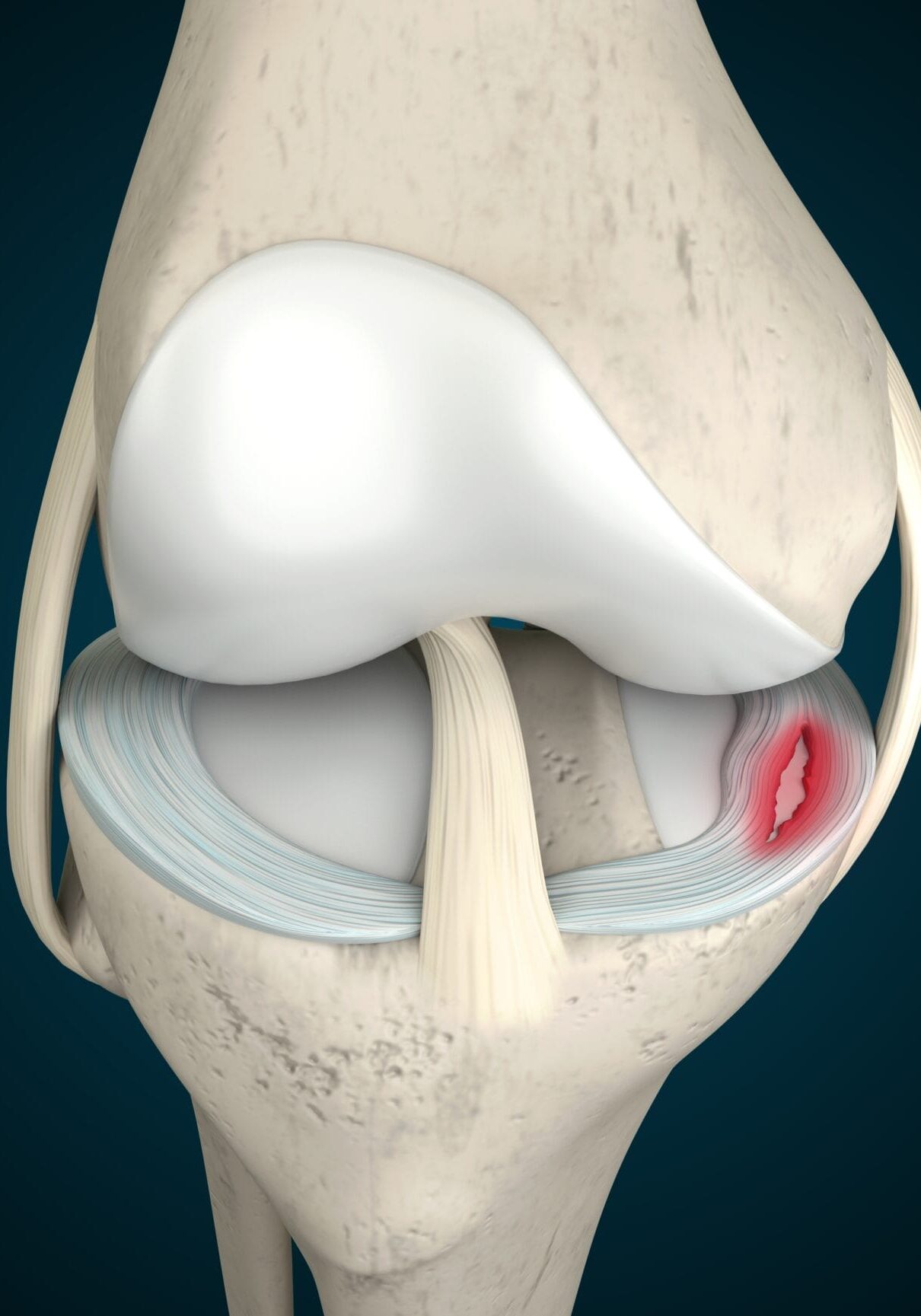A meniscus tear is a common knee injury that can affect people of all ages, particularly athletes or those engaged in physical activities.
What is the meniscus?
The medial meniscus is a c-shaped cartilage in between the bones of the knee joint that acts as a cushion between the thighbone and shinbone.
Tears can result from a sudden twist in your knee, heavy lifting, or general wear and tear as we age. Symptoms may include:
- Knee pain: typically felt on the inside (medial) or outside (lateral) of the knee, especially when you rotate or twist your knee.
- Swelling: the knee may swell within 24 hours of the injury.
- Stiffness: difficulty bending or straightening the knee.
- Clicking or locking: the knee joint might catch or lock, making it hard to move.
- Instability: a feeling of the knee giving way or being unable to support your weight.
Diagnosing a meniscus tear
A physical examination can check for tenderness, swelling and range of motion, before diagnostic scans take place. An MRI scan can provide detailed images of the knee’s soft tissues, helping to confirm the extent and location of the tear.

What are the symptoms of a meniscus tear?
- Knee pain
- Swelling
- Stiffness
- Clicking or locking
- Instability
Surgical treatments for meniscus tear
Surgical treatments for a meniscus tear are often considered when non-surgical methods fail to provide relief or if the tear is severe.
Arthroscopic surgery is a minimally invasive procedure where small instruments and a camera are inserted into the knee through tiny incisions. Depending on the nature of the tear, the surgeon may perform a meniscectomy to remove the damaged portion of the meniscus or a meniscus repair, where the torn edges or sutured together.
Meniscectomy recovery
Typically, meniscectomy patients can expect to resume light activities within four to six weeks, with full recovery usually taking around three months. Patients are encouraged to engage in physiotherapy to rebuild stretch and improve range of motion.
Meniscus repair recovery
Recovery from meniscus repair is more gradual as the tear needs time to heal. Patients may need to use crutches for several weeks to avoid putting weight on the knee, and physical therapy needs to start early to restore mobility but progresses more cautiously. Full recovery, depending on the severity of the tear, can take four to six months.
Are there any alternatives to meniscus tear surgery?
Non-surgical treatments for meniscus tears focus on alleviating pain and reducing inflammation. They are especially effective for minor tears or individuals who may not be good candidates for surgery.
- Rest, Ice, Compression, Elevation (RICE) as initial treatment to reduce pain and swelling
- Physiotherapy to strengthen the muscles around the knee to stabilise the joint and restore normal function
- Over the counter pain relievers
- Corticosteroid injections
Preventing a meniscus tear
Participating in regular exercise can strengthen the muscles around the knee, particularly the quadriceps and hamstrings. Additionally, maintaining a healthy weight reduces stress on the knee.
Preparing your muscles and joints by warming up and stretching before engaging in sports or strenuous activities can reduce the risk of a meniscus tear. It is also important to have proper form and technique during physical exercise to avoid putting unnecessary strain on the knee.
Guide price for self-pay patients
Arthroscopic Meniscectomy
| Estimated Cost * | |
|---|---|
| Initial Consultation | from £220 |
| Diagnostics | from £85 |
| Treatment | from £4,349 |
stimated total cost from £4,654
Estimated length of stay Day Case
* The guide price is effective from 1 January 2026
What's included
The treatment price includes surgery, a private en-suite room, inpatient physiotherapy when applicable, and follow-up consultation. The initial consultation fee and diagnostics will be charged separately. Our private patients also receive continuity of care up to and including 120 days following surgery.
The guide price is based on the usual clinical needs of patients. The price you pay might be different depending on your medical history and the type of implant you choose or your Consultant advises is best for you. Not all Consultants are signed up to Horder Healthcare’s treatment price, please check prior to your appointment.
Your price quotation will be made clear to you before you proceed with any tests, consultations, or treatment.
Self-pay

As a private patient, you don't have to wait for our outstanding care.
Health insurance

Our services are recognised by most of medical insurance companies.
Payment plans

Spread the cost of your treatment with Horder Healthcare 0% payment plans
The Horder Centre Price Promise
 Our prices will always be totally transparent and when you are quoted an all-inclusive procedure price for your operation it will be inclusive of all costs – with no hidden surprises.
Our prices will always be totally transparent and when you are quoted an all-inclusive procedure price for your operation it will be inclusive of all costs – with no hidden surprises.
If you find an alternative private hospital in your local area offering a better price for the same procedure, sold with the same service conditions, we’ll lower our price* to equal it.
*terms and conditions apply
* Price Promise terms & conditions:
(1) Initial consultation(s), diagnostic scans/tests and investigations required to establish a diagnosis are not part of your procedure price.
(2) Our price promise does not include Private Patient Units at NHS hospitals.
(3) Local area defined as within 15 miles of The Horder Centre hospital.
(4) We will match against personalised, written quotes only.
(5) Quotations must be less than 90 days old.
(6) Patients must meet the clinical criteria for admission to the Horder Centre.
Consultants that perform this procedure
Get referred to The Horder Centre today
The Horder Centre provides the highest quality services to NHS, privately insured and self-pay patients, from initial consultation and diagnostic tests right through to surgical treatment and rehabilitation.
We are rated as a 5* healthcare provider
Read our latest patient reviews on Doctify.















